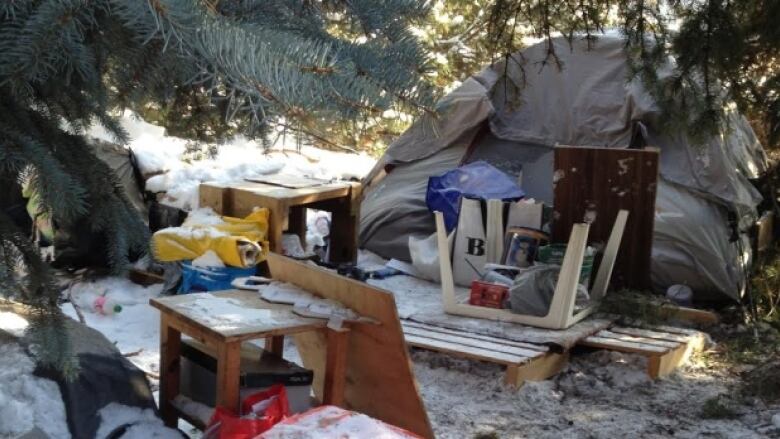Number of homeless in Edmonton decreasing, latest count suggests
The 2016 count found 1,752 people without homes, a 24 per cent decrease from two years ago

There are fewer people living on the streets in Edmonton than there were two years ago, according to preliminary results from the 2016 homeless count.
That latest tally counted 1,752 homeless people, a 24-per-cent decrease from 2014, the last time the count was conducted.

"There are many people in our community that are at risk of losing their housing."
The count is a "snapshot in time," McGee said, but the preliminary numbers show the city appears to be on the right track in dealing with homelessness.
"Housing First is absolutely working," McGee said Tuesday. "There are individuals who have experienced homelessness for decades at the most, and it's not uncommon for years of homelessness to be ended with a Housing First worker working with them to secure housing."
City has 10-year plan to end homelessness
Housing First, a program run by Homeward Trust, provides permanent housing with follow-up care, and is part of the city's 10-year plan to end homelessness.
About 70 per cent of those counted this year are chronically homeless, which means they've lived on the streets for a year or more, McGee said.
Mayor Don Ivesonsaid the city is making progress, but admitted he was surprised to see the number of homeless people has continued to decline.
"Honestly, that was a surprise to me," Iveson said of the latest count numbers. "I thought that because of the economy and because of folks from FortMcMurraywho had been displaced, and I understood hadn't all gone back, that we'd see that number flat instead of down again."
Localefforts have so far found homes from almost6,000 people, Iveson said.
"Folks from the Canadian Alliance to end homelessness and other NGOs on the national scale routinely tell me Edmonton is one of the best, if not the best jurisdiction in the country, when it comes to the success of the Housing First model."
Coun. ScottMckeenapplauded the outreach work done in the community by various agencies, but said there's more that can be done.
"We can do better than this, and we need to pressure all orders of government, including council, to say 'fix that,' " McKeen said.
He pointed to Ambrose Place, a facility for people with addictions and other problems that make them difficult to house, as an example of what the city needs more of.
It may cost money up front but McKeen thinks in the long run there will be huge savings in areas such as health-care costs and policing.
"We'll save money in the long run and we'll house a bunch of wounded, badly wounded people, in appropriate facilities, where they can live lives with some measure of happiness and dignity," he said.
What the numbers show
Of those counted:
- 48 per cent identified as Indigenous (5.4 per cent of Edmonton's overall population identifies as Indigenous);
- three per cent were recent immigrants or refugees;
- 70 people were veterans of the military or RCMP.
The count found an 11-per-cent increase in the number of people using emergency shelters, and a decrease in the number of those sleeping outdoors.
The count was conducted on Oct. 19 and Oct. 20, when hundreds of volunteers canvassed people in the innercity, along LRT routes, in transportation corridors and parks, asking if they identify as homeless.
Data was also provided by shelters, short-term supportive housing providers, and some government agencies that accommodate people overnight.
A full report, including analysis, will be available in the new year.












_(720p).jpg)


 OFFICIAL HD MUSIC VIDEO.jpg)
.jpg)



























































































